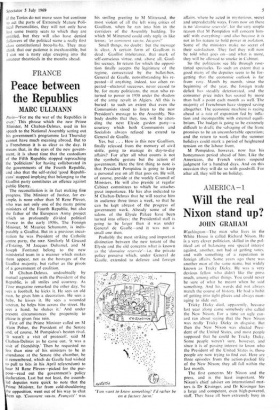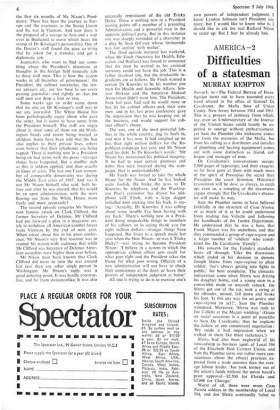AMERICA-1
Will the real Nixon stand up?
JOHN GRAHAM
Washington—The man who lives in the White House is called Richard Nixon. He is a very clever politician, skilled in the pol- itical art of balancing one special interest against, another, not bad at getting votes, and with something of a reputation in foreign affairs. Some years ago there was another man of the same name, but widely known as Tricky Dicky. He was a very devious fellow who didn't like the press much, among other things. You could never be sure of what he meant when he said something. And his words did not always match the course of history. He had a habit of getting into tight places and always man- aging to slide out.
Tricky Dicky died, apparently, because last year along came somebody else called the New Nixon. For a time an ugly can- ard ran about saying that the New Nixon was really Tricky Dicky in disguise. But then the New Nixon was elected Presi- dent of the United States, and most people supposed that he could be Tricky Dicky. Some people weren't sure, however, and since it is of passing interest to know who the President of the United States is, those people are now trying to find out. Here are three episodes from the action-packed life of the New Nixon; they all fall within the last month.
The first concerns Mr Nixon and the press, and is the least important. Mr Nixon's chief adviser on international mat- ters is Dr Kissinger, and Dr Kissinger has a large and competent, even high-powered, staff. They have all been extremely busy in
the first six months of Mr Nixon's Presi- dency. There has been the journey to Eur- ope and the overtures to the Soviet Union and the war in Vietnam. And now there is the proposal of a voyage to Asia and a stop over in Bucharest (a move which bears the stamp of Dr Kissinger's personality). One of the Doctor's staff found the pace so tiring that he asked for a transfer, and got a diplomatic job.
Journalists who want to find out some- thing about the President's intentions or thoughts in the foreign field naturally talk to these staff men. This is how the system works in all branches of government: the President, the cabinet secretaries, the sen- ior advisers etc., are too busy to see every passing journalist—and rightly so—but the staff men can drop a hint or two.
Some weeks ago an order came down that no one on Dr Kissinger's staff was to see any journalist. The White House has been pathologically cagey about who gave the order, but it seems to have come from the President himself. The staff are angry about it, since some of them are old Wash- ington hands and resent being treated as children. Some have been told that the ban also applies to their private lives, others even believe that their telephones are being tapped. There is nothing new in a President being on bad terms with the press—stranger things have happened. But a muffler such as this is seldom applied, and then usually in times of crisis. The last one I can remem- ber of comparable dimensions was during the Middle East crisis of 1967. And was it not Mr Nixon himself who said, both be- fore and after he was elected, that his would be an open administration, with the news flowing out from the White House more freely and more accurately?
The second episode concerns Mr Nixon's now famous attack on Clark Clifford, the former Secretary of Defence. Mr Clifford had put forward a plan in a magazine art- icle to withdraw all American combat forces from Vietnam by the end of next year. When asked about this in his press confer- ence, Mr Nixon's very first reaction was to remind his nation-wide audience that while Mr Clifford was Secretary of Defence Amer- ican casualties were higher than ever before.
Mr Nixon must have known that Clark Clifford did more to turn the war around last year than any other single person in Washington. Mr Nixon's reply was a good debating point. It was hardly construc- tive, and far from statesmanlike. It was also uncannily reminiscent of the old Tricky Dicky. There is nothing new in a President scoring points off a member of a preceding Administration and a powerful man in the opposite political party. But in this instance one was sharply reminded of a character in a play by Sean O'Casey whose insinuendo was fair seethin' with malice'.
The third episode matured last weekend, when Mr Finch (Secretary for Health, Edu- cation and Welfare) was forced to announce that the man he wanted as his assistant secretary could not have the job. This is a rather involved tale, but the irreducible in- gredients are as follows. Mr Finch wanted a certain Dr Knowles to be his number one man for Health and Scientific Affairs. Sen- ator Dirksen and the American Medical Association didn't want him. The President, back last year, had said he would more or less let his cabinet officers pick their own men, and in his last press conference gave the impression that he was keeping out of the business, and would support his cab- inet officer's choice.
The AMA, one of the most powerful lob- bies in the whole country, dug its heels in, and now it has won. It had coughed up no less than eight million dollars for the Re- publican campaign last year, and Mr Nixon paid his debt. In Dr Knowles's words: `Mr Nixon has maintained his political integrity. If he had to meet certain promises and debts that were incurred during the cam- paign, that is understandable.'
Mr Finch was forced to take the whole blame for the fiasco. And he has looked quite foolish. He broke the news to Dr Knowles by telephone, and the Washing- ton Post's cartoonist has drawn his tele- phone call. Finch, with a large dagger initialled RMN sticking into his back, is say- ing: 'Actually, Dr Knowles, I was calling about some trouble I've been having with my back.' There's nothing new in a Presi- dent doing unspeakable things to members of his cabinet, or in saying thank you for eight million dollars—stranger things have happened. But listen to a speech made last year when the New Nixon—or was it Tricky Dicky?—was trying to become President Nixon: 'I believe in a system in which the appropriate cabinet officer gets credit for what goes right and the President takes the blame for what goes wrong. Officials of a new administration will not have to check their consciences at the door, or leave their powers of independent judgment at home.'
All one is trying to do is to exercise one's own powers of independent judgment j know Lyndon Johnson isn't President any more, but I would like to know who is. I should like to ask the real Richard Nixon to stand up. But I fear he already has.



































 Previous page
Previous page